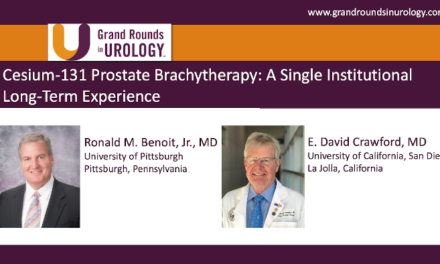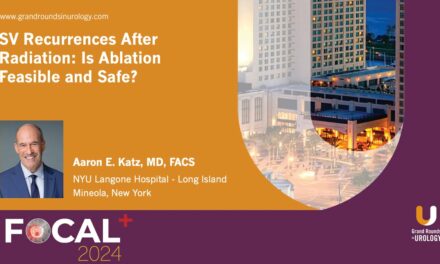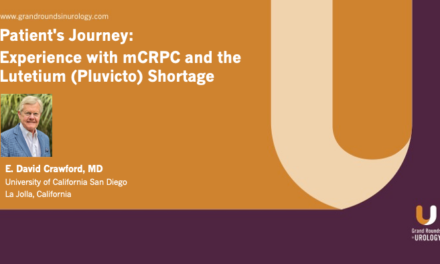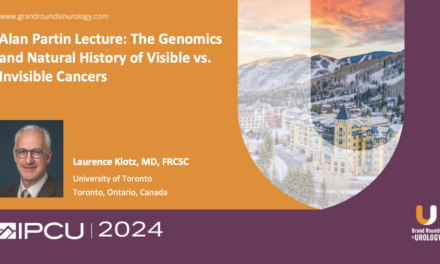Sigrid V. Carlsson, MD, PhD, MPH, presented “Screening and Prevention of Prostate Cancer 2021 (Part 2): Who Needs a Biopsy?” for the Grand Rounds in Urology audience in June 2021.
How to cite: Carlsson, Sigrid V. “Screening and Prevention of Prostate Cancer 2021 (Part 2): Who Needs a Biopsy?” June 2021. Accessed Apr 2025. https://grandroundsinurology.com/screening-and-prevention-of-prostate-cancer-2021-part-2-who-needs-a-biopsy/
Screening and Prevention of Prostate Cancer 2021 (Part 2): Who Needs a Biopsy? – Summary:
In part 2 of a 3-part series, Sigrid V. Carlsson, MD, PhD, MPH, Assistant Attending Epidemiologist at Memorial Sloan Kettering Cancer Center, goes over her 5 Golden Rules for prostate cancer testing, which are intended to minimize overdiagnosis and overtreatment while also making sure that significant disease is not missed. Rule 1 is to get consent and engage in shared decision-making with patients. Dr. Carlsson notes that this can sometimes be difficult since the numerous decision aids available are often difficult to use and understand. The second rule is not to screen men who will not benefit, for instance, older men with multiple comorbidities and short life expectancies. Dr. Carlsson does observe, however, that instituting an age cutoff does not necessarily make sense, and that physiologic assessment of life expectancy may be a more useful metric. In rule 3, Dr. Carlsson advises clinicians not to biopsy patients without a compelling reason, since prostate biopsies may lead to infectious complications and hospitalization. She then lays out the options for risk stratification, such as risk calculators, biomarker tests, and MRI. Rule 4 recommends against treating low-risk disease since, as Dr. Carlsson explains, active surveillance is a safe strategy over longer follow-up for appropriately selected patients with Grade Group 1 prostate cancer when following a well-defined monitoring plan. Finally, rule 5 exhorts clinicians to send patients who require treatment to a high-volume provider. This is key, Dr. Carlsson argues, since evidence shows that there is a large degree of heterogeneity among surgeons regarding functional and oncological outcomes after prostatectomy, and it takes approximately 250 surgeries for a surgeon to really master the procedure.
Part 1 of this series was published last week and can be viewed here. Part 3 will be published on GRU next week
ABOUT THE AUTHOR
Sigrid V. Carlsson, MD, PhD, MPH, is Director of Clinical Research at Memorial Sloan Kettering Cancer Center’s (MSKCC) Josie Robertson Surgery Center and Assistant Attending Epidemiologist, with dual appointments in MSKCC’s Departments of Surgery (Urology Service) and Epidemiology and Biostatistics. Her line of research focuses on screening and early detection of prostate cancer, including multiplex testing and risk-stratified strategies that incorporate clinical information, biomarkers and magnetic resonance imaging, as recently funded by an NIH/NCI U01 award (PI: Carlsson).
Dr. Carlsson also serves as Associate Professor of Experimental Urology affiliated with the Institute of Clinical Sciences, Sahlgrenska Academy, Gothenburg University, in Sweden, where she is an investigator of two large randomized controlled trials of prostate cancer screening (GOTEBORG-1&2), as recently published in the New England Journal of Medicine (Hugosson J, et al. N Engl J Med 2022). In addition, Dr. Carlsson is Adjunct Senior Lecturer in the Department of Translational Medicine in the Division of Urological Cancers in the Medical Faculty at Lund University, Lund, Sweden.
Dr. Carlsson recently completed a K22 career development award from the NIH/NCI to improve shared decision-making for breast and prostate cancer screening. She serves on the National Comprehensive Cancer Network (NCCN) and is a panel member for the American Urological Association (AUA) guidelines for early detection of prostate cancer. Before pursuing postdoctoral studies in urologic oncology at MSKCC, Dr. Carlsson was a physician in Sweden. She earned her MD and PhD from Gothenburg University in Sweden and earned an MPH from Harvard TH Chan School of Public Health in Boston, Massachusetts.




